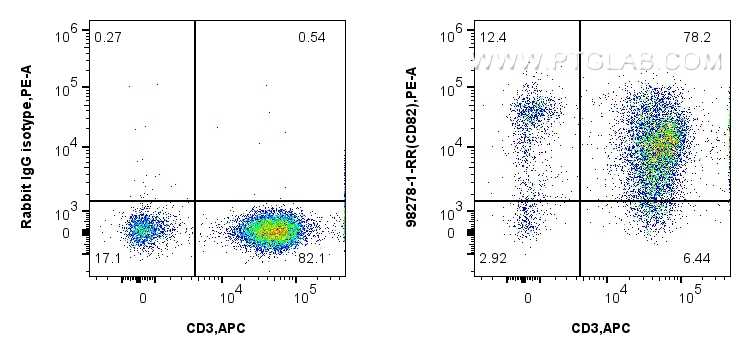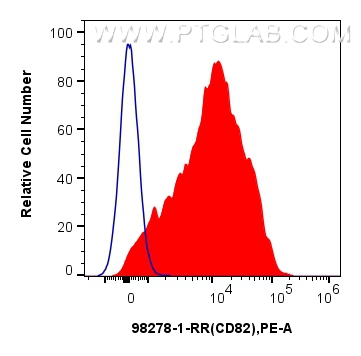验证数据展示
经过测试的应用
| Positive FC detected in | human PBMCs |
推荐稀释比
| 应用 | 推荐稀释比 |
|---|---|
| Flow Cytometry (FC) | FC : 0.25 ug per 10^6 cells in 100 μl suspension |
| This reagent has been tested for flow cytometric analysis. It is recommended that this reagent should be titrated in each testing system to obtain optimal results. | |
| Sample-dependent, Check data in validation data gallery. | |
产品信息
98278-1-RR targets CD82 in FC applications and shows reactivity with human samples.
| 经测试应用 | FC Application Description |
| 经测试反应性 | human |
| 免疫原 |
Recombinant protein 种属同源性预测 |
| 宿主/亚型 | Rabbit / IgG |
| 抗体类别 | Recombinant |
| 产品类型 | Antibody |
| 全称 | CD82 molecule |
| 别名 | CD82, KAI1, Metastasis suppressor Kangai-1, IA4, CD82,KAI1, CD 82 |
| 计算分子量 | 30 kDa |
| GenBank蛋白编号 | NM_002231.4 |
| 基因名称 | CD82 |
| Gene ID (NCBI) | 3732 |
| 偶联类型 | Unconjugated |
| 形式 | Liquid |
| 纯化方式 | Protein A purfication |
| UNIPROT ID | P27701-1 |
| 储存缓冲液 | PBS with 0.09% sodium azide, pH 7.3. |
| 储存条件 | Store at 2 - 8°C. Stable for one year after shipment. |
背景介绍
CD82 is a membrane glycoprotein and belongs to the tetraspanin superfamily, many of which are implicated in the regulation of cell motility, morphology, fusion, signaling, fertilization, and differentiation. CD82 was originally identified as a suppressor of metastasis located on human chromosome 11p11.2 in prostate carcinoma. The majority of evidence indicates that CD82 expression is downregulated or abolished in a variety of malignant tumors. CD82 is present at high levels in human monocyte and macrophage lineages and in various epithelial cells in the prostate, lung, pancreas and many other tissues. In epithelial cells, CD82 is implicated in diverse biological processes such as cell adhesion, migration, apoptosis and morphogenesis.
实验方案
| Product Specific Protocols | |
|---|---|
| FC protocol for CD82 antibody 98278-1-RR | Download protocol |
| Standard Protocols | |
|---|---|
| Click here to view our Standard Protocols |



